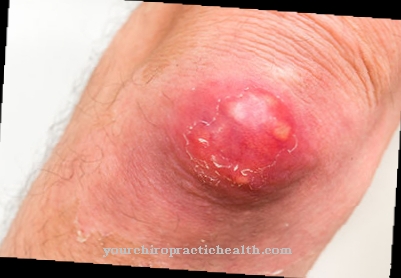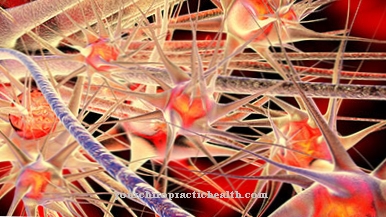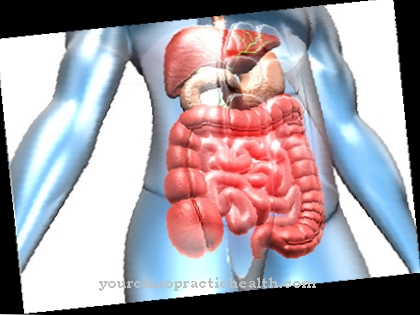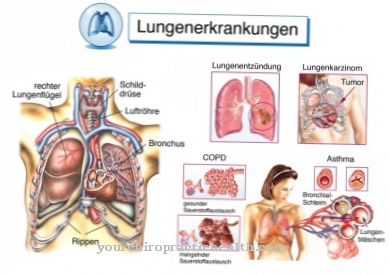Wegener's disease (Synonyms: Granulomatosis with polyangiitis, granulomatous polyangiitis, Wegener's granulomatosis, and Wegener's granulomatosis) is a chronic inflammation of the blood vessels that is comparatively rare with an incidence of 5 to 7 per 100,000 population. Men are more frequently affected than women, with the age peak in Wegener's disease being around 50 years of age.
What is Wegener's disease?

© Sebastian Kaulitzki - stock.adobe.com
As Wegener's disease is an inflammatory disease of the blood vessels, which is associated with necrosis and a manifestation of granulomas in the lower (lungs) and upper respiratory tract (nasal cavity, oropharynx, middle ear) as well as in the kidneys.
In the initial stage, the disease manifests itself in the form of cold or flu-like symptoms such as headache and joint pain, fatigue, fever and weight loss. Later, the disease generalizes and in most cases (around 80 percent) glomerulonephritis (inflammation of the kidney corpuscles) and microaneurysms develop in the kidneys.
The chronic vasculitis (inflammation of the vessels) characteristic of Wegener's disease leads to insufficient blood flow and supply to the affected organs, whereby in principle all organ systems can be affected.
causes
The cause or etiology of the Wegener's disease is so far unknown. It is assumed that the disease can be traced back to a dysregulation of the immune system, which as a result of this disorder synthesizes antibodies (c-ANCA) against the body's own blood cells.
The specific triggers for the dysregulation have not yet been clarified. The involvement of inhalation allergens, which lead to a hypersensitivity reaction of the immune system (allergic reaction), is discussed.
Likewise, bacterial infections of the nasal mucosa with staphylococcus aureus and a possible genetic disposition (disposition) are assumed to be potential trigger factors. In addition, Wegener's disease can in some cases be associated with an alpha-1 antitripsin deficiency (genetic disease of the protein metabolism).
Symptoms, ailments & signs
Wegener's disease can affect various organ systems and trigger a variety of symptoms. At the beginning of the illness, symptoms in the ear, nose and throat area are usually in the foreground: Characteristic are a chronic cold with blood, frequent nosebleeds and ulcers of the oral mucosa.
If the granuloma spreads to the paranasal sinuses, inflammation associated with pain in the forehead and jaw area is the result. Involvement of the ears is noticeable in the form of severe ear pain, and dizziness attacks occasionally occur. Signs of changes in the throat can include difficulty swallowing, hoarseness and a dry, tickly cough, reaching into the lungs can lead to coughing up blood and severe shortness of breath with an acute risk of suffocation.
Severe breath-dependent chest pain can indicate pleurisy or pericarditis. Many patients suffer from inflammation of the eyes and visual disturbances, especially in the initial phase of the disease, later kidney involvement can trigger high blood pressure. If blood is found in the urine, inflammation of the kidney corpuscles (glomerulonephritis) should be considered.
Other possible symptoms of Wegener's disease are painful, pressure-sensitive swellings in the joints (especially on the extremities) as well as abnormal sensations and numbness in toes and fingers. Bleeding skin and small skin ulcers also occur, and entire areas of the skin can die as the disease progresses. In addition, unspecific complaints such as tiredness, exhaustion, loss of appetite and weight loss often occur.
Diagnosis & course
A suspicion of Wegener's disease results when two of the so-called four ACR criteria (oronasal inflammation, pathological chest x-ray, pathological urine sediment, granulomatous inflammation) can be clinically confirmed.
The diagnosis is confirmed by a biopsy followed by a histological examination, in the course of which necrotizing and partially granulomatous vasculitis of the smaller blood vessels can be detected in Wegener's disease. A blood test also shows increased CRP and creatinine values (kidney failure) as well as leukocytosis as a marker for chronic inflammation and an accelerated sedimentation rate.
In the presence of glomerulonephritis, c-ANCA (anti-neutrophil cytoplasmic antibodies) and erythrocyturia (blood in the urine) can also be detected. The x-ray shows shadows in the area of the paranasal sinuses and infiltrated lung tissue, while a CT (computer tomography) can detect granulomas, scars and caverns (pathologically noticeable cavities).
In a differential diagnosis, Wegener's disease should be differentiated from bronchial carcinoma and Goodpasture's syndrome. If not treated, Wegener's disease has a poor (unfavorable) prognosis with a fatal outcome. In the majority of cases (90 percent), on the other hand, an improvement in symptoms can be achieved as part of therapy, although the risk of recurrence is very high.
Complications
This disease usually results in a significant reduction in life expectancy in most patients. The symptoms of this disease can be very different and do not always have to be characteristic, so that in many cases an early diagnosis and treatment is not possible. Those affected mainly suffer from coughs and runny nose and appear tired or exhausted.
There is also a severe reduction in the patient's resilience and inflammation in the nose or ears. This inflammation can significantly reduce the quality of life. Sometimes bronchitis occurs. Patients also often suffer from inflammation of the eyes, which can be accompanied by visual problems.
Furthermore, there is a fever and pain in the limbs, which leads to movement restrictions in everyday life. The quality of life is significantly reduced by Wegener's disease. Without treatment, kidney failure can also occur, which, if left untreated, can lead to patient death. Treatment can reduce most symptoms.
The life expectancy of the person affected is, however, significantly reduced and restricted despite treatment. The patient is also dependent on regular checkups and can also suffer from mental illnesses due to the symptoms.
When should you go to the doctor?
An increased tendency to bleed is considered unusual and should be monitored further. If there is an increased occurrence of nosebleeds or bleeding of the gums, the observations should be discussed with a doctor. A doctor is also required in the event of disorders of the sensory perception.
Worrying are ear pain, inflammation of the eyes, impaired vision, impaired breathing or a dry cough. Changes in the act of swallowing or the vocalization must be presented to a doctor. If there is a shortness of breath, it is an acute life-threatening condition. A rescue service is to be alerted and first aid measures to be initiated so that the patient does not die prematurely.
Swelling of the joints, impaired locomotion or general mobility disorders should be examined and treated. Discrepancies in blood flow, unusual sensations on the skin or a loss of muscle strength should be clarified by a doctor. High blood pressure, irregularities in the heart rhythm and unsteady gait should be examined. Rapid exhaustion, a decline in normal performance and a loss of well-being are warnings from the body that should be discussed with a doctor. Fatigue, an unwanted decrease in body weight, loss of appetite and refusal to eat must be presented to a doctor. There is a threat of an undersupply of the organism, which can lead to an acute health-threatening situation.
Treatment & Therapy
Due to the unexplained etiology, a Wegener's disease not be treated causally, but only symptomatically. The therapeutic measures aim to throttle the dysregulated immune system and are adapted to the stage.
In an initial and locally limited stage, a drug combination therapy consisting of cotrimoxazole, which consists of the antibiotics trimethoprim and sulfamethoxazole and is also used prophylactically against oronasal colonization with staphylococcus aureus, and a low-dose glucocorticoid such as prednisolone is recommended. If there is a generalized stage with life-threatening extra-respiratory symptoms, high-dose prednisolone and the cytostatic cyclophosphamide are usually used, with the latter being substituted by another cytostatic such as methotrexate in the event of a contraindication.
Short-term shock therapy with methylprednisolone, which is administered intravenously, may also be indicated in the case of resistance to therapy. If remissions can be determined, the cytostatic can be replaced by immunosuppressants such as mycophenolate or azathioprine, which are usually better tolerated, while the dose of prednisolone is gradually tapered to a permanent dose.
Renal insufficiency requiring dialysis and / or pulmonary bleeding are treated as part of a plasmapheresis, in which the body's own plasma is substituted with a solution of electrolytes and hydrogen carbonate. When choosing individual drug therapy, the risk of kidney damage, which can significantly reduce life expectancy, should be taken into account. Because of the side effects, kidney function in particular should be monitored closely in the presence of Wegener's disease.
Outlook & forecast
If left untreated, Wegener's disease has an extremely poor prognosis. In this case, the inflammations continue to spread and lead to permanent damage. Hearing and vision as well as kidney function are particularly affected. If the kidneys are affected, death from kidney failure can occur within a few months. Frequent inflammations in the nasal area are also reflected in a so-called saddle nose (depression of the bridge of the nose).
On the other hand, therapy counteracts the spread of inflammation. Life expectancy and quality hardly change with early diagnosis and treatment. In more than 90 percent of those affected, the therapy significantly reduces the symptoms, in 75 percent even to the point that at least temporarily a symptom-free life is possible (complete remission). Nevertheless, in around 50 percent of those affected in remission, there is a possibility that symptoms will recur even with successful treatment.
In addition, the long-term or repeated use of immunosuppressive drugs and corticosteroids (maintenance therapy) is associated with an increased risk of infections and the development of cataracts. Regular checks of the blood count and eyesight are therefore necessary. In addition, steroid-related hair loss, acne, mouth ulcers and weight gain are possible.
prevention
Since the exact trigger factors and the etiology of the Wegener's disease are unexplained, the disease cannot currently be prevented.
Aftercare
In most cases, the person affected with Wegener's disease has only very limited and very few direct follow-up measures available, so that the person concerned should ideally see a doctor very early. An early diagnosis can prevent further complications. However, since this is a hereditary disease, it can usually not be completely cured, so that the person affected always has to rely on a doctor.
Genetic testing and counseling is advisable, especially if you wish to have children, in order to prevent the recurrence of Wegener's disease. During the treatment itself, in most cases, patients are dependent on the intake of various medications that can alleviate and limit the symptoms.
The doctor's instructions should always be followed, and the correct dosage should also be observed. Those affected are also dependent on regular controls and examinations of the internal organs, whereby the kidneys in particular should be checked. The further course of the disease depends very much on the time of diagnosis, so that a general prediction can usually not be made. In some cases, Wegener's disease reduces the life expectancy of those affected.
You can do that yourself
This disease can be very stressful for those affected, especially if Wegener's disease was recognized late. Although all symptoms of the disease can be treated, the patient's quality of life is usually severely limited.
For many patients and their relatives, it is advisable to seek psychotherapeutic treatment in addition to the medically necessary therapies in order to take the pain off the ground. It is also helpful to have contacts with the local Wegener's disease self-help groups, which can be found on the Internet. Alternatively, those affected can also contact the vasculitis self-help group (www.vaskulitis-shg.de), which deals with all rare autoimmune diseases that lead to chronic vascular inflammation. The links and tips listed there can make everyday life much easier for those suffering from Wegener's disease.
You also benefit from relaxation techniques of any kind, because they also work against tiredness and the feeling of exhaustion, from which patients suffer more. Yoga, progressive muscle relaxation according to Jacobson, Qigong and Tai Chi are recommended here. But the new, alternative forms of therapy such as music therapy, laughter yoga or the EFT tapping therapy should also be tried out, because they have already proven to be a relief for people with Wegener's disease.





.jpg)


















.jpg)



